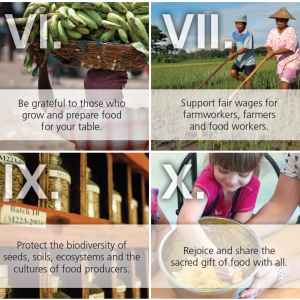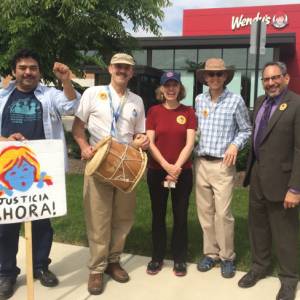Posts Tagged: hunger
PHP’s Food Justice VISTAs ~ Where are they now?
 PHP had the honor to work with 17 smart, talented, and dedicated folks who came to us through the Americorps VISTA program – a program currently on the chopping block of the currently proposed administration’s budget, alongside a number of other vital federal programs that make our world a better, fairer place. The gifts these VISTAs brought… Read more »
PHP had the honor to work with 17 smart, talented, and dedicated folks who came to us through the Americorps VISTA program – a program currently on the chopping block of the currently proposed administration’s budget, alongside a number of other vital federal programs that make our world a better, fairer place. The gifts these VISTAs brought… Read more »
The Ten Commandments of Food
 Just in time for the global Food Week of Action! The Food Week of Action begins on Monday, October 10 and includes World Food Day on October 16. Our team has developed these 10 Commandments and Manoj Jurian, coordinator of the Food for Life Campaign, has created this tool for congregations, with brief theological reflections… Read more »
Just in time for the global Food Week of Action! The Food Week of Action begins on Monday, October 10 and includes World Food Day on October 16. Our team has developed these 10 Commandments and Manoj Jurian, coordinator of the Food for Life Campaign, has created this tool for congregations, with brief theological reflections… Read more »
PC(USA) Endorses Wendy’s Boycott
 The PC(USA) was the first Christian denomination to sign on for the national boycott, the timing of which anticipates the company’s annual meeting on May 26. “Rather than support Florida growers who uphold human rights under the Fair Food Program, Wendy’s switched its tomato purchases to Mexico, where the denial of human rights in the… Read more »
The PC(USA) was the first Christian denomination to sign on for the national boycott, the timing of which anticipates the company’s annual meeting on May 26. “Rather than support Florida growers who uphold human rights under the Fair Food Program, Wendy’s switched its tomato purchases to Mexico, where the denial of human rights in the… Read more »
PC(USA) Priority on Children
Support a strong Child Nutrition Act!
1) Send this PC(USA) Action Alert to your representatives in Congress: capwiz.com/pcusa
2) Have your congregation sign onto this organizational letter to Congress for the Farm to School Act: bit.ly/org-sign
3) Sign your name to the citizen sign-on letter: bit.ly/pcusa-cnr
 Presbyterian Women, Presbyterian Hunger Program, PC(USA) Office of Public Witness, and Educate a Child Initiative are joining with our interfaith partners in Washington DC and the National Farm to School Network and the National Sustainable Agriculture Coalition to advocate for a strong Child Nutrition Act that also advances farm to school priorities, all with a shared goal of healthier children who are ready to learn, and resilient local food and farm systems.
Presbyterian Women, Presbyterian Hunger Program, PC(USA) Office of Public Witness, and Educate a Child Initiative are joining with our interfaith partners in Washington DC and the National Farm to School Network and the National Sustainable Agriculture Coalition to advocate for a strong Child Nutrition Act that also advances farm to school priorities, all with a shared goal of healthier children who are ready to learn, and resilient local food and farm systems.
“There can be no keener revelation of a society’s soul than the way in which it treats its children.” – Nelson Mandela
*** Download the PDF flyer to share with your congregation and others ***
Read more »Corporate Ag Says They Will Feed the World. Really?
Since agriculture emerged 10,000 years ago, it has been smaller-scale producers who have fed the world. Industrial, high-tech and chemical-intensive farming has only been around for about 80 years, and still today it is small-scale farmers, ranchers, pastoralists and fishers who provide approximately 70% of all the food eaten on Earth[1].
Marketing professionals and lobbyists from Monsanto, ADM and companies promoting industrial agriculture and GMOs [we’ll call that Big Ag for shorthand] have spread a myth, which people of all stripes have swallowed. This myth claims that only large-scale industrial agriculture can feed a hungry world. The myth consists of two parts: (1) More food is the answer to feeding people; (2) Corporate, industrial agriculture is the approach that can fill this need.
First, the myth that more food will feed a hungry world.
Read more »Top Food Stories
 A big thank you to Adam Liebowitz at North Star Fund, a fellow member of the Sustainable Agriculture and Food Systems Funders, for this great collection of news on all things food and farming.
A big thank you to Adam Liebowitz at North Star Fund, a fellow member of the Sustainable Agriculture and Food Systems Funders, for this great collection of news on all things food and farming.
ECONOMICS & TRADE
Don’t Let Food Industry Stir the Pot. Pam Kock, Huffington Post, Mar 23, 2015
The PR War Continues: Monsanto and the myth of peaceful coexistence. Laetitia Benador, Food First, Apr 2, 2015
Trade Rules Create Obstacle Course for a Better Food System. Karen Hansen-Kuhn, IATP, May 15, 2015
John Oliver Explains the Abuses of the Chicken Industry (Not the Ones You Think). L.V. Anderson, Slate, May 18, 2015
Walmart’s Sustainability Promises: Myth vs. Reality. Steve Holt, Civil Eats, Jun 5, 2015
Egg rationing in America has officially begun. Roberto Ferdman, Washington Post, Jun 5, 2015
Whole Foods Markets: Throwing Organic Farmers Under the Bus? Cornucopia Institute, Jun 12, 2015
ENVIRONMENT & FARMING PRACTICES
Climate Change Poses Serious Threats to Food Distribution. Elizabeth Grossman, Earth Island Journal, Mar 4, 2015
FOOD JUSTICE & ADVOCACY
The Color of Food: America’s Invisible Farmers. Natasha Bowens, Civil Eats, Apr 14, 2015
The Color of Food: Building Autonomy as African American Farmers. Natasha Bowens, Civil Eats, Apr 14, 2015
Promised a Supermarket Five Years Ago, a Housing Project Is Still Waiting. Keith Williams, New York Times, Apr 17, 2015
The World Bank’s Long War on Peasants. Eric Holt-Giménez and Tanya M. Kerssen, Food First, Apr 20, 2015
What happened to America’s black farmers? Madeleine Thomas,Grist, Apr 24, 2015
Justice for farmworkers as labor rights bill makes overdue progress in the New York State Senate. Editorial, NY Daily News, May 3, 2015
Can We Finally Treat Food Workers Fairly? Mark Bittman, New York Times, May 27, 2015
The New Food Movement Has a Problem with Race. Lauren Rothman, Mucnhies, May 29, 2015
The Food Revolution and the War for Our Minds. Jonathan Latham, Rural America, Jun 12, 2015
HEALTH & FOOD ACCESS
Lessons from Supermarket Failure in a Food Desert. Kate McCleary, Liveable Future, May 5, 2015
School Lunch May Be Next to Nudge Antibiotics Off the Plate. Maryn McKenna, National Geographic, May 8, 2015
OTHER
In Newark, a Vertical Indoor Farm Helps Anchor an Area’s Revival. C.J. Hughes, New York Times, Apr 7, 2015
Why “Clean Label” School Lunch May Be a Pipe Dream. Bettina Elias Siegel, Civil Eats, Apr 9, 2015
Council Members Ask De Blasio to Invest in Farmland. Samar Khurshid, Gotham Gazette, Apr 21, 2015
USDA Report Shows Increase in Activity of Local and Regional Food Systems. AJ Hughes, Seedstock, May 10, 2015
Vermont: America’s Food Relocalization Laboratory. Steve Holt, Civil Eats, May 13, 2015
Let’s Help Create More Farmers. Mark Bittman, New York Times, Jun 10, 2015
30 Women Under 30 Changing Food. Danielle Nierenberg, Huffington Post, Jun 23, 2015
Resources for Refugee Gardens
Planning your church refugee garden
Are you interested in beginning your own church refugee garden? We’re sharing these documents created by Arrive Ministries to support your endeavor and help address some frequently asked questions.
Contact a local refugee organization or Catholic Charities to see what programs may already exist and to begin developing relationships with refugees in your area.
Church Garden Models contains a listing of the types of refugee gardens that have been established here in the Twin Cities. There are a number of different ways churches can engage in gardens; you may even come up with new ideas of your own!
Church Gardening Goals provides a list of reasons for churches to create gardens for refugees. These reasons are some of the ones cited by those hosting church gardens and refugee gardeners and are helpful in enlisting support of your local church board and membership.
Church Gardens Sample Guidelines is a list of rules based on First Evangelical Free Church (Maplewood) Harvest Community Gardens model. Many area churches develop a similar list and provide it to gardeners at the start of the season, usually as a part of gardener orientation. First Evangelical Free Church has many years experience of conducting a community garden on a large scale. In 2014 they had more than 1200 plots!
Matters to Consider is a document that has been compiled through evaluations and discussions with existing church gardens. These are their suggestions to others – things they felt everyone should be aware of before beginning a garden project.
ADDITIONAL RESOURCES ~ Gardening, Food & Faith
Read more »Corporate Ag Says They Will Feed the World. Really?
Since agriculture emerged 10,000 years ago, it has been  smaller-scale producers who have fed the world. Industrial, high-tech and chemical-intensive farming has only been around for about 80 years, and still today it is small-scale farmers, ranchers, pastoralists and fishers who provide approximately 70% of all the food eaten on Earth[1].
smaller-scale producers who have fed the world. Industrial, high-tech and chemical-intensive farming has only been around for about 80 years, and still today it is small-scale farmers, ranchers, pastoralists and fishers who provide approximately 70% of all the food eaten on Earth[1].
Marketing professionals and lobbyists from Monsanto, ADM and companies promoting industrial agriculture and GMOs [we’ll call that Big Ag for shorthand] have spread a myth, which people of all stripes have swallowed. This myth claims that only large-scale industrial agriculture can feed a hungry world. The myth consists of two parts: (1) More food is the answer to feeding people; (2) Corporate, industrial agriculture is the approach that can fill this need.
First, the myth that more food will feed a hungry world.
Read more…
Sojourn to India & Sri Lanka
I was blessed with an eight-week extended study leave spanning from January 19, when I pointed myself in the direction of India, until March 17, when I landed back in about-to-bloom Louisville. Part of the eight weeks in India and Sri Lanka was meeting Presbyterian Hunger Program Joining Hands partners and learning about their efforts to strengthen their food sovereignty. Part was immersing myself in this ancient/modern, spiritual/material land to learn from the people how they navigate and stay healthy in a rapidly changing world, and to rejuvenate myself as I celebrate 16 years of service to the Presbyterian Church (U.S.A.).
This page is designed to help you virtually travel with me. You will find my crazy route, photo galleries, videos and reports. All are found on this Interactive Map and they are also listed below. Click on this link or the map to open it in another window.
Read more »
